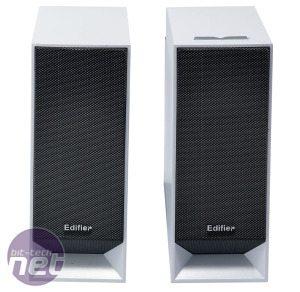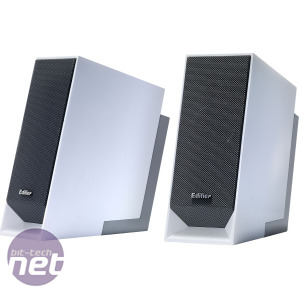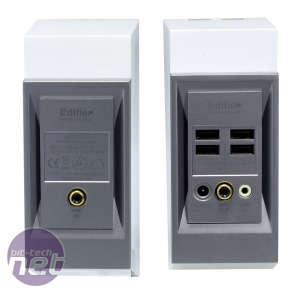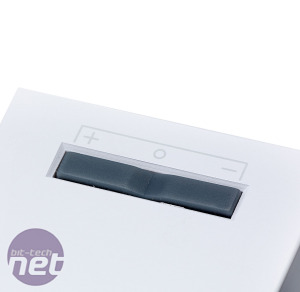
Edifier Prime USB review
Manufacturer: EdifierUK price (as reviewed): £49.99 (inc VAT)
US price (as reviewed): $84.99 (ex tax)
There’s more interest in speakers for iPods and laptops than for desktop PCs, if the rate of speaker launches is any indication. This latest laptop-orientated set has an integrated 3-port USB 2 hub, so a single cable is all that’s needed to connect all your peripherals to your laptop. The USB cable carries digital audio too. We had no trouble playing music or a video soundtrack while simultaneously using a thumb drive, a bus-powered USB hard disk and a wireless mouse dongle, all connected to the hub.
There’s a mini-jack input too, and although plugging in a cable disables the USB audio input, this shouldn’t be too much of an inconvenience. The lack of a headphone output is more annoying, though, especially as most laptops’ DAC chips and headphone amps sound pretty dire.
The minimalist white design does its best to be elegant, but to our eyes it looks a little tacky. This isn’t helped by the use of white USB, speaker and power cables, which stand out against the desk; as usual, they’re also full of kinks when they come out of the box. The cable joining the left and right speakers is just 1m long, which creates a fairly narrow stereo image. We also found that the white plastic side panels of the speakers quickly gathered smudges.
The controls amount to a strip of three buttons along the top of the right speaker, with the volume control located on either side of a power switch. The latter is rubbery and recessed, and pressing it felt uncomfortably intimate. Still, the volume control does an admirable job, gently fading audio up and down with no ungainly clunks; nor does it affect power supply to the USB hub.
It isn’t easy to make speakers this small that display any semblance of bass response, and sure enough, these speakers exhibited a very poor level of bass. A 40Hz test tone was just about audible, but the speakers didn’t really kick into life until 90Hz, flattening out at around 120Hz.
There were some strange kazoo-like resonances around 500Hz, which bordered on painful at around 3KHz. There was some good old-fashioned digital distortion at 4.5KHz and sub-harmonic beats from 5KHz all the way to 20KHz. Switching to the mini-jack analogue input eliminated the digital distortion and sub-harmonics but couldn’t rectify the erratic frequency response or the kazoo impressions.
It’s hardly surprising that these sonic problems equated to less than impressive sound quality in our music tests. The weak bass was the most conspicuous problem, with kick drums and basslines barely registering, while other instruments lacked depth and sounded scratchy. The top volume wasn’t as loud as we’d like, although the less than flattering tone didn’t incite us to increase it.
Conclusion
The integrated USB hub is a great idea that’s well implemented, but there’s little else to admire about these speakers. From their cheap appearance to their unflattering sound quality, there’s nothing positive to note about them.They’re good enough for the odd dip into BBC iPlayer or some casual gaming, but music and movie playback, and more serious gameplay deserve something a great deal better. The Creative T12 Wireless costs the same, swaps the USB hub for an equally handy Bluetooth audio receiver and produces sound quality that’s in a different league.
-
Value12 / 30
-
Features18 / 30
-
Sound Quality16 / 40


MSI MPG Velox 100R Chassis Review
October 14 2021 | 15:04












Want to comment? Please log in.